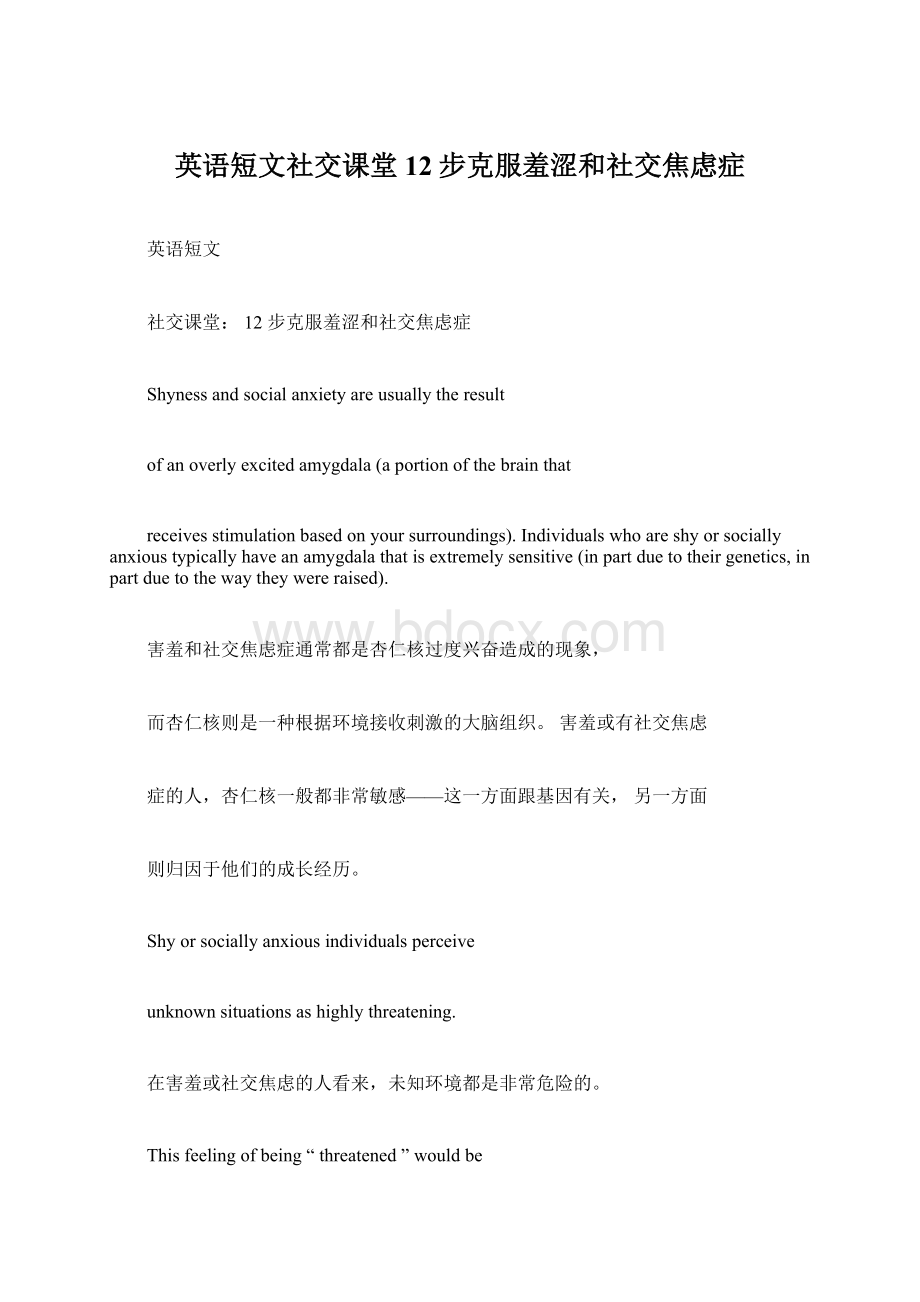英语短文社交课堂12步克服羞涩和社交焦虑症Word文档格式.docx
《英语短文社交课堂12步克服羞涩和社交焦虑症Word文档格式.docx》由会员分享,可在线阅读,更多相关《英语短文社交课堂12步克服羞涩和社交焦虑症Word文档格式.docx(28页珍藏版)》请在冰豆网上搜索。

认清事实
Stepnumberoneistorecognizewhatistakingplace
chemicallyinyourbrainwhenyou’refeelinganxiousorshy.
第一步就是要弄清楚当你感到紧张或害羞时,大脑会发生
怎样的化学变化。
Youarenotabnormal;
yourbrainisjust“unusuallysensitivetonewstimuli,causingyoutoproceedwithextreme
”
caution
–
usually
“unnecessarycaution.
”Just
knowingthis
willhelpyourationalizewhat’sgoingonandwillhelprelax
youinfuturesituations.
你没有“不正常”:
只不过你的大脑对新刺激“格外”敏
感罢了,以至于你表现得特别谨慎——一般都是些“不必要的谨慎”。
认识到这一点有助于你理性面对正在发生的事情,进而在以后环境中
做到自如放松。
Noneedtobecomeshyoranxious,justtellyourself
thatit’sjustsomechemicalsandcellsreactingbasedona
perceived
threat
that
’snot
really
there
–no
needto
panic
(ignoretheracingheartandsweatypalms)
andproceedintelligently.
–justcalmdown
没必要害羞或焦虑,你只要告诉自己:
这些不过是假想危险引发的化学与细胞反应罢了。
也没必要惊慌,别去管那加速的心跳和冒汗的手心,尝试镇静下来并机智应对。
2.Don’tPonderonNegativeThoughts
不要陷入消极思维
Whenyougiveapresentation
’salways
threepresentationsinvolved:
There
’sthepresentationyou
plannedongiving,there’sthepresentationyouactuallygave,
andthenthere’sthepresentationyouwishyougave.
如果你要作报告,那么报告无非就三种形式:
你正在发布
的报告、你已经发布的报告,以及你打算发布的报告。
Whenyoufocusonwhatyoucouldhavedonebetter,
whenyoufocusonthenegative,youcreateacycleofnegativity.
Afteryouleaveameeting,oradinnerparty,orasocial
gathering,
don’tponderonhowyoucouldhavebeen
“better.
Don’tthink,
“WhydidIsaythat?
当你一味想着本可以做得更好时,当你只看到消极方面时,
你就会形成消极循环模式。
所以,会议、派对或集会结束后,请不要纠结自己本可以表现得“更出色”,也不要懊恼“刚才我干嘛要那样说?
”。
Everyonesayssomethingfoolishfromtime-to-time,
however,focusingonnegativitywillleadyoutobelievethat
youareapersonwhosaysthewrongthingsatsocialgatherings;
thatbeliefwillmanifestitselfeverytime.Recognizethat
everyonesayssomething
foolishfrom
time-to-time;
don’t
ponder,moveon.
每个人难免都会说些蠢话,如果你只看到消极面,渐渐就
会真的以为自己在社交时只会说错话;
而且,这种想法每次都会应验。
请记住:
每个人偶尔都会说些蠢话。
所以,不要纠结,该干啥就干啥
去吧。
3.NoPressure
不要有压力
Don’tfeelpressuretobeinteresting,entertaining,
ortalkative.Justbeyournormal-naturalself.It
’sthe
pressureto
belikesomeoneelsethatenhancessocial
anxiety
andshyness.
不要为了表现得风趣、讨人喜欢或健谈而感到紧张不安。
做回你平常的样子就行。
模仿别人的压力会加剧社交焦虑感和羞涩。
Youhavesurvivedparticipatinginconversationsyourentirelife.Yournextconversationinagroupisjust
onemoreconversation–youarenotrequiredtobethelifeoftheparty.Justbeyourselfandspeakyourmindwhenyou
havesomethingtosay
–andifyoudon
’thaveanythingto
say
–nopressure;
“chillout
”andhavefun.
你这辈子一直就是在与人谈话中成长过来的。
接下来在小
组中的发言实质上也是谈话而已——你又不一定非得成为派对的活
跃分子啊。
你只要做好自己,有话就说、无话则沉默;
不要紧张,放
松点吧。
4.Don’tAssume
别去假想
Don’tassumethatpeoplearejudgingyou.Mostpeopleareprimarilyconcernedaboutthemselvesandhowtheycomeacross;
theydon’thavetimetobeconsumedbyyourbehavior.
Rememberthis,ifyoudon’trememberanythingelseinthisarticle:
Everyoneisawkwardattimes!
别去假想其他人怎么看你。
多数人通常只会考虑自身和自
己的遭遇,没人有时间来关心你如何如何。
要是这篇文章没能给你留
下什么印象,那么请记住这句话:
有时每个人都很难相处!
Whenhavingconversations,everysinglepersonat
onetimeoranotherdoesorsayssomethingthat
’salittle
awkward.
Don’t
feelthat
awkwardsituations
orstrange
silencesareyourfaultalone.Don
’ttakecreditforallthe
negatives
inaconversation.
Awkwardthings
will
happen,
willbesilences,
that’sokay;
it
’sperfectly
normal,
don’
tthinkit
’snot
andkeeponbeing
yourself
–yourbest
self.
交谈时,每个人间或都会说出难堪的话来。
不要一厢情愿
地以为是你造成了这种尴尬的处境或别扭的沉默。
不要把谈话的失败
全都怪罪到自己身上。
尴尬时常发生,沉默也总是出现,没什么大不
了的;
这很正常,不要少见多怪——做好你自己就行啦。
5.Don’tPanic–Pause
不要慌张——稍作停顿
There’snoneedtopanicinsocialsituations.If
someoneasksyouaquestion,justpause.Thinkaboutthe
questionandthenansweritappropriately.Mostsociallyanxiousorshyindividualsreacttoquestions.Theyfeeltheneedtoansweraquestionimmediately,assoonasthefinal
wordleavesthemouthoftheotherperson;
theyfeelobligated
tostartspeaking–notnecessary.
社交场合无需慌张。
要是有人向你发问,那就先停顿一下,
想清楚后再恰当回答对方。
大部分社交焦虑或害羞的人总是立刻回答
问题。
他们觉得只要对方话刚说完,就该作出回答;
他们认为谈话是
一种“义务”——其实完全没必要这样。
Youneverwanttoreacttoaquestion;
youalwayswanttorespond,afteryoupause.
你不需要立即回应提问,你只需在停顿之后回答提问。
Whenyoudothis,youwillsoundmorethoughtful,
moreinsightful,andyouwillhavegivenmoredeliberate
thoughttowhatyou’reabouttosay.Youwillappeartohave
“executivepresence.”
当你这样做时,你听上去会更有想法和见解,你的想法会
显得更成熟、更具执行力。
Theneedtorespondrightawayshowsthataperson
isn
’t
comfortable
with
silence.
It
’s
the
least
“powerful”personinaconversationwhodoesn’ttobesilence,butsilenceisokay.Itshowsthatyouarecomfortableinyourskin.
wantthere
立即回应则显得一个人不习惯沉默。
通常,谈话中最没有
气场的人也最不习惯沉默,其实沉默也没什么。
它说明你能够做到悠
然自若。
Solearn
topause,neverpanic!
Gatheryourthoughts,
avoidsaying
“um”andanswerlike
theintelligent
personthat
youare.
所以,学会停顿,不要慌张!
整理好思绪,改掉“嗯啊”,像机智的人那样去回答问题吧。
6.BodyLanguage
肢体语言
Yourphysiologywilldetermineyourpsychology.
你的生理能决定你的心理。
Avoidhavingthebodylanguageofsomeonewhoisshy
and/ortimid.Don’thaunchoverandtrynottobeseen.
不要染上害羞或胆怯的人的肢体语言。
不要缩手缩脚躲起
来。
Standtall,shouldersback.Peoplewillbelievebodylanguageyouportraymorethanthewordsyousay!
Ifyoulooktimid,peoplewillbelieveyouaretimidandwilltreatyoulikeatimidperson.
请挺直腰板。
你的肢体语言远比口头言谈更有信服力
!
如
果你看上去就很羞怯,人们也会这么认为,接着就会把你当作羞怯的
人对待。
Tobeseenasaleader,walklikeapresident.Take
upspace—likeyou’reaking.Putyourfeetonthedesk,
makelargehandgestures,standtall.Ifyoupossessthebodylanguageofaleader,peoplewillbegintotreatyoulikealeader.Theywillassumethatifyouhandleyourselflikeaking,ifyoudresslikeaking,youmusthavegoodreasonfordoingso.Peoplewillbelievetheimageyouportray!
请像领导一样出场,如总统一般大步流星。
像国王那样压住气场——把脚搁在桌上、采用大气的手势、抬头挺胸。
如果你拥有领导的肢体语言,人们就会像对待领导那样对你。
他们会觉得,要是你穿得像个国王、举止也像国王,那你肯定有两下子。
你所树立的形象可以赢得人们的信任!
7.BeTheFirstToInitiate
成为第一个主动的人
Don’twaitforotherstointroduceyou;
youshould
initiatetheintroduction.IrecentlysawU.S.PresidentBarackH.Obamaontelevision;
hewaswalkingintoavotinglocationtocasthisballotforthe2012U.S.Presidential
Election.Iwatchedtoseehowhisdemeanordifferedfromothers.
不要等别人来介绍你,你应该先主动介绍自己。
最近我在
电视上看到美国总统巴拉克?
奥巴马:
他向投票点走去,竞选2012
年的美国总统。
我一直留意他的言行究竟如何与众不同。
Here’swhatstoodout:
hewalkedconfidentlywith
asmileonhisface,andhetooktimetointroducehimselfto
theindividualsintheroom.That’sall,anditmadehimappeartobeverypresidential,veryconfidentinhimself.
这个与众不同就是:
他面带微笑地自信地走过去,然后开
始向房间里的所有人介绍自己。
就凭这样,已经使他显得非常有总统
范儿、对自己非常有信心了。
Hecouldhavewalkedintherewithhisheadhelddown,
assumingeveryoneknewwhohewas,likethesociallyanxious.Butinstead,heownedhisspace,heinitiatedcontactandlookedverypowerfulintheprocess.
本来他也可以低着头走过去,心里猜测别人怎么看他,一
副社交焦虑的样子;
但是,他压住了气场、主动开始了交流,整个过
程都显得很有震慑力。
8.MoveSlow
放慢动作
One“surefire”waytoappearsociallyanxiousis
tomakelotsofsuddenmovements.Considerthelion,thelion
onlymoveswhenitisnecessary,allofitsmovementsare
deliberate.Thelionappearsconfident;
thelionisconfident.
显得社交焦虑的一个“致命”方法就是一下子做太多动作。
想想狮子吧,只会在必要时出动,而且每次出动都很慎重。
狮子不仅
看上去很自信,也确实很有信心。
Nowimaginethechipmunk,chipmunksareconstantly
“lookingovertheirshoulder,
”theymakelotsofsudden
movements,alwaysonthewatch–always
appearing
to
be
supremelynervousandonguardagainstattackers.
再想想花栗鼠——是西望、来去、望不停,
看上去似乎非常,在防者一。
Slow,deliberatemovementswillnotonlymakeyouappearmoreconfident,itwillactuallycontributetoyour
personalconfidencebank⋯soavoid“chipmunklike”behavior.
慢而慎重的作不使你看上去更自信,上也能真
正提高你的自信力。
所以,千万不要有花栗鼠一的行啊